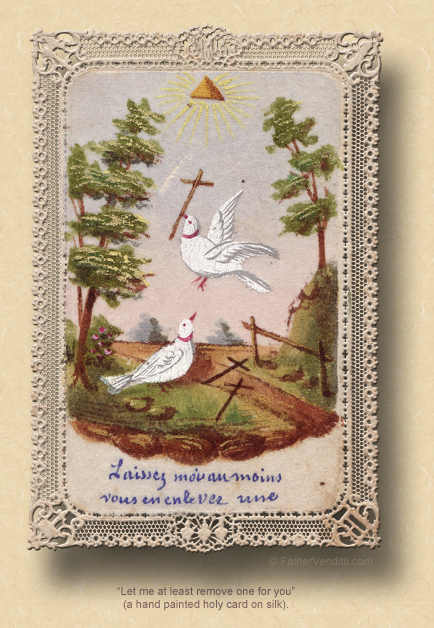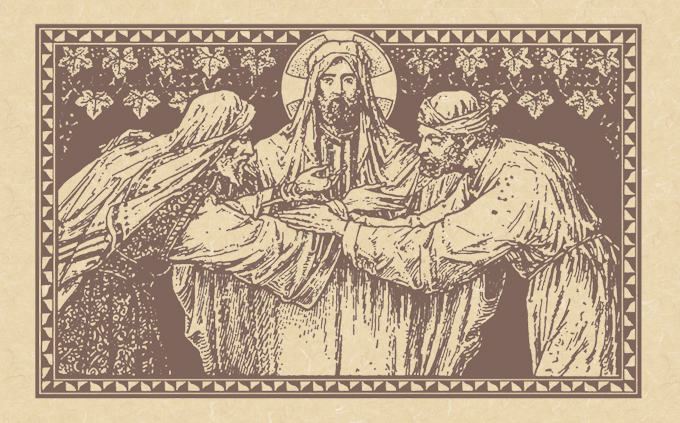One Man's Meat Is Another Man's Poison.
The Memorial of Saint John Chrysostom, Bishop & Doctor of the Church.*
Lessons from the secondary feria, according to the ordinary form of the Roman Rite:
• I Corinthians 9: 16-19, 22-27.
• Psalm 84: 3-6, 12.
• Luke 6: 39-42.
|
…or, from the proper:
• Ephesians 4: 1-7, 11-13.
• Psalm 40: 2, 4, 7-11.
• Mark 4: 1-10, 13-20.
[or, Mark 4: 1-9.]
…or, any lessons from the common of Pastors or the common of Doctors of the Church.
|
The Sixteenth Thursday after Pentecost.
Lessons from the dominica,** according to the extraordinary form of the Roman Rite:
• Ephesians 3: 13-21.
• Psalm 101: 16-17.
• Luke 14: 1-11.
FatherVenditti.com
|
 8:03 PM 9/13/2018 — Turning our attention again to our first lesson from First Corinthians, the dispute that Paul is addressing—whether it’s okay to eat meat offered to idols, requires a little bit of history to understand. 8:03 PM 9/13/2018 — Turning our attention again to our first lesson from First Corinthians, the dispute that Paul is addressing—whether it’s okay to eat meat offered to idols, requires a little bit of history to understand.
The problem, basically, was this: when you're poor, you tend to buy your meat from the cheapest source, and the cheapest source in Corinth was a place that sold what was—for lack of a better term—“used” meat, that is, meat that had been used in some ritual sacrifice in a pagan temple, but which was now for sale at a discount. Some of the Christians were taking advantage of this discount, while others were claiming that, because this meat had been used in a pagan ritual, it was not suitable for consumption by Christians. Paul's decision is a compromise: he says that, since the pagan religions are all false and their rituals empty, there is no moral implication to a Christian eating that meat; but, if by eating it, scandal is given to Christians who are not intelligent enough to understand this, it is better not to eat it than to give scandal. In other words, there's nothing wrong with eating the meat unless it offends someone; and, if it's going to offend someone and give scandal, then, even though there's nothing wrong with it, the charitable Christian will make the added sacrifice for the sake of his brother or sister.
But what's important to keep in mind is that this peculiar sounding complaint may have been brought by some of the wealthy Jewish Christians converted by Apollos, who were uncomfortable at having to share the Eucharist with the lower-class, much poorer Gentile Christians converted previously by Paul, and who would have been most likely to have taken advantage of the less expensive meat discarded by the pagan temples following its use in a ritual. Another, perhaps more legitimate, interpretation may be that this "second hand" meat was being sold by the temples themselves as a kind of fund-raiser, so that buying it could be interpreted as a financial contribution to a pagan temple.  In any case, there is no way Saint Paul, far away in Ephesus, could have known which of these two concerns—one based on prejudice and the other based on a real religious concern—was the real motivation for the complaint; thus, he crafts a compromise solution which addresses the religious concern without giving any legitimacy to those who may have been motivated by a class-based bigotry. Paul's remark, therefore, that those who are strong should be patient with the scruples of those who are weak, could be interpreted as an underhanded put-down to those making the complaint. In any case, there is no way Saint Paul, far away in Ephesus, could have known which of these two concerns—one based on prejudice and the other based on a real religious concern—was the real motivation for the complaint; thus, he crafts a compromise solution which addresses the religious concern without giving any legitimacy to those who may have been motivated by a class-based bigotry. Paul's remark, therefore, that those who are strong should be patient with the scruples of those who are weak, could be interpreted as an underhanded put-down to those making the complaint.
It's a minor issue compared to some of the other topics he addresses in this letter, which is probably why he doesn't want to get too involved in it; nevertheless, it raises an important point. We are all at different places in our desire to follow our Lord. Some of us can pray for hours, while others can barely muster the attention span to say a single Hail Mary once a day; some can pray the Holy Mass in Church with attention and devotion, while some find it difficult to remain focused and find the time spent in church difficult to endure; some people struggle with moral issues and temptations every waking moment of the day, while others are not bothered at all. It's analogous to the people who can't seem to loose any weight no matter how severely they starve themselves compared to those who can eat all they want and never put on an inch. We're all individuals, and so the Christian life comes more easily to some than to others.
The principle behind the Apostle's point is that none of us can succeed in living a Christian life unless we help one another, and one of the ways we do this is by being patient and understanding with those who may not be at the same level we are. It doesn't mean we take a relativistic approach to Christian living; it does mean that we position ourselves to help rather than scold.
Let’s ask our Blessed Lord today to grant us the humility that comes from self-knowledge, and the compassion that comes from true charity.

* Born in Antioch, Syria, St. John (349-407) was given the moniker
"Chrysostom" (from the Greek for "Golden-Mouthed") because of his eloquent and powerful preaching. He entered monastic life and was later consecrated Archbishop of Constantinople; his resolve in the midst of controversy distinguished him as much as his many writings on Catholic doctrine and Christian life. He died in exile.
He is particularly venerated in the Eastern Churches as the author of the Divine Liturgy used most frequently in the Byzantine Tradition.
** In the extraordinary form, on ferias outside privileged seasons, the lessons come from the previous Sunday.
|

